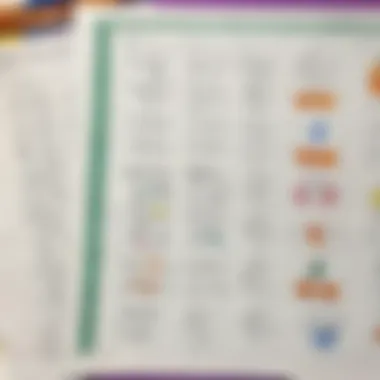Free Printable Maths Worksheets for Preschoolers


Intro
Math can sometimes feel like a mountain to climb for young kids. That’s the beauty of free printable maths worksheets! They provide a gentle slope that leads little learners toward mastering the essential skills they need for school and beyond. This guide takes a closer look at how these resources work wonders for preschoolers, making math not only accessible but also enjoyable.
Parents and educators play a crucial role in shaping a child’s perception of math. Worksheets can bridge the gap where other methods might stumble. They offer a structured way to practice counting, addition, shapes, and more, all while kids remain engaged. Exploring the array of available options and how they can be integrated into daily learning routines sets the stage for a fruitful educational experience.
Creative Activities
Worksheets are not just about filling in numbers. There’s a creative side to this, encouraging children to explore maths through hands-on activities. Here’s what you can do to make math learning fun and engaging:
Craft Ideas
Getting crafty can reinforce mathematical concepts. Think about projects like shape collages where children cut out and paste different colored shapes onto paper, helping them learn to recognize and classify geometric figures. Another idea might be creating number charts filled with stickers, making counting tangible and visual.
Step-by-Step Guides
For each craft activity, providing a step-by-step guide is essential. Here’s a simple example:
- Gather Materials: Collect colored paper, scissors, glue, and stickers.
- Choose Shapes: Decide which shapes to use (circle, square, triangle).
- Create Collage: Cut out shapes and arrange them on a sheet of paper.
- Decorate: Use stickers to adorn the shapes, emphasizing numbers by counting as they add.
- Display: Hang the finished collage on the wall, celebrating the art of math.
Educational Value
Engaging in these activities provides more than just fun. They enhance fine motor skills, foster creativity, and deepen understanding of mathematical concepts through tactile learning. While kids cut, paste, and count, they’re also building a strong foundation for future learning.
Fun Quizzes
Quizzes can be a delightful addition to worksheets, measuring what children have absorbed and ensuring they’re on the right track. Think of them as learning games that keep preschoolers on their toes.
Quiz Topics
Popular topics for preschool-based quizzes include:
- Counting up to ten
- Basic addition and subtraction
- Identifying shapes and colors
- Comparing sizes (big/small, long/short)
Question Types
The variety of questions can make a significant impact on engagement. Using multiple-choice questions allows kids to think critically about their responses, while fill-in-the-blank questions can test their recall. Picture-based questions can be especially effective, as they tap into visual recognition skills.
Knowledge Reinforcement
These quizzes serve as a great reinforcement tool. They allow kids to see what they've learned in a fun way. Getting answers right can boost confidence, while those that require a second look can guide areas needing more focus.
Fact-Based Articles
There’s a wealth of knowledge beyond worksheets and quizzes. Exploring fact-based articles can enrich a child’s learning experience.
Topics
Subjects might include:
- The importance of numbers in daily life
- Fun facts about shapes in nature
- How math is involved in cooking
Engaging Content
Good articles are crafted to be engaging, using simple language and visual elements like images or diagrams. They explain concepts clearly, ensuring kids can grasp the material without overwhelming them.
Prolusion to Maths Worksheets in Early Education
Mathematics in preschool is not merely about numbers; it's the foundation on which a child's cognitive abilities are built. Introducing maths at an early age fosters not just the understanding of numbers but also enhances problem-solving skills and logical reasoning. Kids engage with the world through patterns and relationships. Therefore, establishing a solid groundwork in maths is essential.
Importance of Mathematics in Preschool
Mathematics isn't confined to rote memorization of numbers or simple counting. It's a way of thinking and understanding one's environment. In preschool, introducing mathematical concepts allows children to:
- Develop critical thinking skills that will serve them throughout their education.
- Enhance their ability to notice patterns, which is a key cognitive skill.
- Forster an early capacity for problem-solving, an essential life skill.
- Build confidence in their abilities—success in small tasks lays groundwork for larger challenges.
Understanding numbers and basic operations helps children make sense of their day-to-day activities. For instance, when a child counts blocks during playtime, they engage in a fun yet educational exercise, bridging the gap between abstract concepts and tangible experiences. Moreover, preschool maths introduces children to essential social skills as they collaborate with peers to solve simple problems, thus preparing them for future teamwork in school.
Role of Worksheets in Learning
Worksheets serve as effective tools to reinforce the mathematical concepts introduced in preschool. They provide a structured approach to learning, making abstract concepts concrete. The tangible nature of worksheets allows children to:
- Practice independently: Their interaction with worksheets can often facilitate self-learning, allowing kids to explore at their own pace.
- Engage with the material: A worksheet can make learning more appealing and less intimidating by presenting information in a playful manner.
- Provide a measure of progress: Parents and educators can easily assess a child's understanding of concepts through completed worksheets.


Worksheets can encompass various activities, from number tracing to simple addition and subtraction problems. The combination of visuals and written tasks caters to multiple learning styles, including visual and kinesthetic learners.
"Worksheets turn abstract ideas into a captivating journey of exploration for young minds. They become not just a task but an adventure in learning."
Types of Maths Worksheets Available
When we talk about maths worksheets for preschoolers, we're opening up a treasure chest of learning tools. These aren't just any worksheets; they are specifically designed to cater to the developing minds of young children, aiding them in grasping basic mathematical concepts. Each type of worksheet focuses on a different element of math, ensuring that kids have a rounded understanding of fundamental skills. Let’s dive into what these different types of worksheets offer and why they are crucial for early education.
Counting and Number Recognition
Counting worksheets serve as the first stepping stone into the world of mathematics. They typically include images or objects that children can count, helping them develop a sense of quantity. For instance, a worksheet might have a row of five apples where kids are asked to circle or color a specific number. Not only does this encourage one-to-one correspondence, but it also helps in number recognition. As children engage with these sheets, they're not merely learning numbers; they’re building confidence in their ability to quantify the world around them.
"Counting is the beginning of understanding numbers and math!"
These activities usually employ vibrant visuals and engaging themes that resonate with preschoolers. Consider integrating counting by incorporating everyday items found at home. Doing this connects the classroom experience to real life, making it relatable and tangible for kids.
Basic Addition and Subtraction
Once kids are comfortable with counting, worksheets focusing on basic addition and subtraction come into play. These worksheets can be simple, featuring problems that require the child to combine two sets of pictures or subtract one from the other. For example, a worksheet showing three butterflies plus two more can help kids visualize the operation. Manipulatives, such as blocks or buttons, can also enhance understanding.
Such activities not only foster problem-solving skills but also introduce the language of maths in a playful manner. “What happens when we take away two apples from five? Let’s find out!” This really helps to solidify concepts rather than just rote memorization.
Shape Identification and Sorting
Moving into geometry, shape identification worksheets provide a fun way to learn about different shapes. Able to recognize shapes like circles, squares, and triangles is important for cognitive development. Activities might include matching shapes to their outlines or sorting objects according to their geometric properties.
Sorting tasks can stretch beyond just shapes, too. For example, ask kids to separate red blocks from blue ones or large items from small ones. This builds understanding of categories, and fosters critical thinking skills—it's not just about shapes but discerning attributes.
Patterns and Sequencing
Lastly, worksheets that focus on patterns and sequencing allow preschoolers to explore the concept of order. Recognizing patterns is an important skill that has implications in math and other areas. Worksheets often have simple patterning tasks, such as completing a sequence of colors or shapes.
Consider using everyday items, like fruits, to create patterns. "An apple, a banana, an apple what comes next?" This encourages observational skills and engages kids in making predictions, laying the foundation for more complex mathematical concepts down the road.
In summary, these diverse types of maths worksheets not only introduce basic concepts but also provide a nurturing framework for young learners to flourish. By selecting the right worksheets, educators and parents can create a supportive learning environment that promotes both understanding and enjoyment of mathematics.
Finding Quality Free Printable Worksheets
Finding high-quality free printable maths worksheets is pivotal in fostering a child’s mathematical skills at an early age. The right worksheet can engage young learners not just in rote memorization, but in problem-solving and critical thinking. When educators, parents, or caregivers seek out these resources, it’s essential to prioritize not only their variety but also their pedagogical value. In this section, we will explore some reliable avenues to find effective worksheets and emphasize considerations that can enhance the learning experience.
Online Educational Resources
The internet acts as a treasure trove of free printable maths worksheets. Numerous educational websites cater specifically to preschool education. Organizations dedicated to early childhood education often provide carefully crafted worksheets that meet developmental standards.
Some mainstream options include:
- Education.com: Offers a mix of worksheets that cover everything from counting to basic addition.
- Khan Academy Kids: While primarily known for its app, this resource has a website loaded with printable activities.
- Scholastic: Known for its books, but they also provide free educational resources with an enjoyable design for young learners.
When choosing online resources, ensure that the worksheets align with your child’s current learning objectives. Quality worksheets not only encourage engagement but also promote the seamless integration of math concepts into everyday play.
Educational Blogs and Websites
Many educators and parents turn to blogs and dedicated educational websites for worksheets rich in creativity and teaching strategies. These platforms often share insights from real-life experience, offering worksheets that reflect an understanding of a preschooler's learning process.
Here are a few notable blogs and sites:
- The Measured Mom: This blog is full of free worksheets and learning activities, with a focus on early literacy and mathematics.
- Teaching Mama: Known for easy-to-follow instructions and high-quality printables, this blog introduces fun math concepts using creative ways.
- PreKinders: This site is dedicated to preschool education and features a plethora of resources, including unique printable worksheets.
Blogs can offer more than just worksheets; they often provide insights on how to effectively present the material, catering to various learning styles.
Utilizing Social Media Platforms for Resources
Social media has become an unexpected ally in the quest for educational resources. Platforms like Facebook, Instagram, and Pinterest are bustling with creative educators and parents sharing their own worksheets and activities.
On Facebook, groups dedicated to homeschooling or teaching preschool often share links to printable worksheets or their own creations. Searching for groups like "Preschool Teaching Resources" can reveal countless materials and ideas.
Pinterest serves as a visual platform where users can save and share educational content. By simply searching for “preschool maths worksheets,” you can stumble upon a wealth of unique resources and ideas, many of which link directly to blogs or educational sites.
Engaging with these communities can also lead to a collaborative experience, where sharing ideas helps all caregivers and educators involved to improve the quality of education they provide.
"Quality worksheets serve as the bridge between play and structured learning, paving the way for children to explore mathematics effortlessly."
Finding quality, free printable worksheets doesn’t have to be a daunting task. By exploring online resources, educational blogs, and social media platforms, educators and caregivers can tap into materials that not only support preschool mathematics but also foster a love for learning.


Benefits of Use in Preschool Education
When it comes to preschool education, worksheets play a pivotal role that often goes unnoticed. They aren't just sheets of paper filled with numbers and shapes; they're gateways to a world of learning that supports children's overall development. These worksheets help nurture various skills that are foundational for future education and everyday life. Whether a child is making sense of numbers or developing fine motor skills, integrating worksheets into their learning routine can enrich their educational experience.
Enhancing Cognitive Skills
Worksheets are effective tools for enhancing cognitive skills in young learners. They challenge preschoolers to think critically, solve problems, and make connections between concepts. When a child works through a counting worksheet, for example, they don't just recognize numbers; they begin to understand quantity, sequences, and basic mathematical relationships.
Moreover, these exercises help stimulate memory retention. Activities like matching numbers with pictures can significantly strengthen neural pathways, making it easier for the brain to recall information in various contexts later on.
"Cognitive development is an intricate dance between information and experience."
This is where worksheets come into play, providing structured experiences that promote not just memory but also comprehension and reasoning. Children learn to recognize patterns and develop logical thinking skills that will eventually influence their overall academic performance.
Support for Visual and Kinesthetic Learners
Every child has a unique learning style that suits them best, highlighting the necessity for versatile educational resources. Worksheets are adaptable to multiple learning modalities, particularly benefiting visual and kinesthetic learners.
Visual learners often thrive when they can see and manipulate elements. Worksheets featuring colorful graphics, shapes, and diagrams can capture their attention, making learning not only enjoyable but also impactful. For instance, using a worksheet with vibrant illustrations can help kids visualize math concepts like addition in a tangible way.
Meanwhile, kinesthetic learners learn best through hands-on activities. While worksheets might seem stationary, they can encourage physical engagement. For example, a child might trace numbers with their finger on a printed worksheet. Or they might cut out shapes they’ve colored and arrange them based on the directions provided. This physical interaction deepens their understanding while keeping consistent with their preferred learning style.
Fostering Independence in Learning
Another significant benefit of worksheets revolves around fostering independence in learning. As children complete worksheets, they gradually learn to rely less on direct instruction and more on their own problem-solving abilities. This encourages a sense of accomplishment, making them more confident in their skills.
When children tackle a worksheet that’s just the right challenge, they experience what educators refer to as the “zone of proximal development.” They find themselves in a space where the tasks are neither too easy mand they won't flip into confusion. This balance helps them develop persistence and resilience as they work through challenges.
Practical Strategies for Using Worksheets
Using worksheets in preschool is not just plopping a sheet of paper in front of a child and moving along. There’s art and science in utilizing these tools effectively. Think about incorporating them into daily life and how they can adjust to a child’s pace. This section digs into the nitty-gritty of practical strategies, outlining how to effectively integrate math worksheets into a preschool curriculum while keeping young minds engaged and stimulated.
Incorporating Worksheets into Daily Routines
Children thrive on routines, and integrating worksheets into these daily rituals can make learning seamless. Picture a scenario where breakfast is followed by a little worksheet time—perhaps some number tracing or counting actual cereal pieces. This can solidify their love for learning, masking education as a fun activity!
- Schedule Specific Times: Set aside a few minutes each day, like after lunch or before bedtime, to work on worksheets. Consistency can foster a sense of security for kids.
- Use Everyday Objects: Tie worksheets to what’s in their environment. If they love books, use a worksheet focused on counting books or recognizing their favorite characters!
- Transition Activity: Use worksheets as a calming transition before more active play. Having quiet focus can prepare them for a smoother shift.
By creating opportunities throughout the day, the worksheets become second nature, blending learning with the fun of play.
Creating a Positive Learning Environment
A child’s environment can significantly impact their eagerness to engage in learning. Developing a space that’s inviting and stimulating is crucial. Instead of an austere desk, think more vibrant and interactive.
- Decorate: Use colors and educational posters to make the learning space lively. Children tend to gravitate towards bright colors and engaging visuals.
- Minimize Distractions: While it's nice to have a fun space, too much going on can scatter a child's focus. Keep toys and distractions away during worksheet time.
- Provide Comfort: Ensure seats are comfortable, and the lighting is soft. Perhaps even have a cozy corner with cushions where they feel snug while learning.
Creating that positive atmosphere signals to preschoolers that learning can be enjoyable, helping them associate worksheets with something they want to do, not just something imposed upon them.
Adjusting Difficulty Levels for Individual Needs
Every child is unique in their learning journey, and worksheets shouldn’t feel like a one-size-fits-all scenario. The challenge lies in crafting a level of difficulty that suits an individual’s needs, fostering growth without causing frustration.
- Start Simple: Begin with basic concepts and progressively build up as the child gains confidence. You can interchange worksheets based on the child’s mood or engagement that day.
- Observe and Adapt: Keep an eye out for patterns in performance. If they breeze through a worksheet, it may be time to bump up the difficulty. Conversely, if they struggle, consider simplifying tasks.
- Offer Choices: Allow children to select which worksheet they want to work on. Giving them a sense of control can motivate them and accommodate their interests.
Adjusting difficulty keeps kids challenged yet ensures they're not daunted. It's essential to walk the fine line between pushing boundaries and providing safety.
“Creating a blend of playful learning and exciting challenges keeps preschoolers engaged and promotes a lifelong love for math.”
In sum, these practical strategies can transform how worksheets are perceived in the learning process. With thoughtful integration and attention to individual needs, parents and teachers can harness the untapped potential of free printable math sheets, fostering an environment ripe for exploration and learning.
Challenges and Solutions
Navigating the world of free printable maths worksheets can be quite the undertaking for preschool educators, parents, or caregivers. Knowing how to use these resources effectively can enhance young learners' experience, but that doesn’t come without its share of bumps in the road.
The journey of learning mathematics is often dotted with challenges, which can stem from various sources. Understanding these obstacles and having solutions at hand can make all the difference in fostering a productive environment for little ones. Acknowledging common challenges not only equips anyone involved in early education but also allows for the development of targeted strategies to counteract these issues.
Common Challenges in Worksheet Implementation
When it comes to implementing worksheets in a preschool setting, several obstacles arise:
- Lack of Engagement: Kids can easily lose interest. A staggering number of worksheets may lack vibrant colors or interactive elements. Many young learners tend to stray if the material doesn’t hold their attention.
- Overwhelm: Too much information on one sheet can be daunting for preschoolers. If a worksheet resembles a dense textbook page, children may feel lost or overwhelmed, generating frustration instead of fostering learning.
- Varying Skill Levels: Each child brings a unique set of skills to the learning table. It’s not uncommon for worksheets to cater to an average level, leaving some children, especially those a bit behind or ahead, without adequate support.
- Parental Involvement: Sometimes, parents might not be available to guide their child through the worksheets. This lack of parental interaction can hinder a child's ability to comprehend the tasks at hand effectively.
Addressing these challenges head-on is crucial for maximizing the impact of these educational tools.


Strategies for Overcoming Resistance
Once obstacles are identified, it’s essential to adopt strategies that can facilitate smoother integration of worksheets into learning experiences:
- Make It Fun: Blending worksheets with playful elements can catch the young learner’s interest. Think stickers, stamps, or financial incentives like a star chart for completed worksheets. Creativity can stir excitement!
- Simplify and Prioritize: Instead of tackling complex pages, break down information into smaller chunks. Focus on one concept per worksheet, lowering the pressure for preschoolers.
- Tailored Approaches: Foster a more adaptive learning environment by adjusting worksheets to match various skill levels. Create multiple versions that span different complexities, ensuring each child feels challenged yet not overwhelmed.
- Encourage Peer Collaboration: Having children work together can alleviate individual pressure. They can learn from one another and turn the task into a team effort. Kids often feel more at ease when working alongside their friends.
- Include Parents: Providing instructions for parents on how they can assist at home boosts the learning environment. Suggesting simple follow-up activities related to the worksheets encourages family involvement in the educational process.
With a tailored approach and collective effort, overcoming challenges in worksheet implementation can cultivate rich learning experiences for preschoolers.
By tackling these concerns proactively, parents and educators can enhance the preschool learning journey, allowing children to develop confidence and curiosity as they explore basic mathematical concepts.
Integration with Other Learning Methods
Incorporating math worksheets into a preschool curriculum should never be a stand-alone activity. Instead, blending these worksheets with various learning methods can create a more rounded educational experience. This integration allows for a richer understanding of mathematical concepts while catering to different learning styles and needs. By considering how worksheets work alongside physical activities and technology, educators and parents can strategically boost children's engagement and comprehension.
Combining Worksheets with Hands-On Activities
Hands-on activities spark curiosity and offer young learners a tangible way to grasp abstract concepts like numbers and shapes. Think of using blocks, buttons, or even fruit to make counting a lively process instead of just a number on paper. For instance, after a worksheet where children trace numbers, they can physically arrange blocks according to the numbers they’ve just learned.
- Benefits of Combining:
- Engages multiple senses, making learning more memorable.
- Helps develop fine motor skills alongside cognitive skills.
- Provides immediate gratification from seeing results in the real world.
Consider this: If a child completes a worksheet on simple addition, they might be prompted to split oranges or count out candies to consolidate daily math learning. This approach transforms an ordinary worksheet into an adventure filled with discovery.
Using Technology to Enhance Learning
In our digital age, technology shows up more than just a nice-to-have. It has become a powerful ally in facilitating children's understanding of math. Interactive apps and educational websites offer worksheets in various formats, often integrating games that reinforce the same concepts taught on paper.
- Key Advantages:
- Provides instant feedback, allowing kids to learn from mistakes quickly.
- Offers dynamic, engaging visuals that maintain attention better than a static page.
- Supports self-paced learning, accommodating individual growth rates.
Parents and educators can utilize platforms such as websites like Wikipedia for additional resources or refer to articles on Britannica for enhanced learning techniques. Moreover, integrating educational tablets can make it fun to practice math skills. Worksheets can extend into apps that let children manipulate numbers visually or play math-based games, reinforcing lessons in a fun way.
Ultimately, the aim is to create a rich learning ecosystem where worksheets serve as a bridge to real-world applications and modern technology. This fusion not only promotes skill mastery but also cultivates a love for learning that lasts beyond preschool.
Evaluating Progress with Worksheets
Evaluating progress with worksheets is a crucial element in fostering an understanding of mathematical concepts for preschoolers. It provides educators and parents with insight on how effectively children are grasping the material. Using worksheets not only facilitates the learning process but also helps in tracking developments over time. By closely monitoring this journey, caregivers can identify strengths and weaknesses, allowing for timely interventions and tailored learning experiences.
Observational Assessments
Observational assessments are one of the most effective ways to evaluate a child's progress while using maths worksheets. This method allows educators and parents to gain a clear view of how children engage with tasks, their problem-solving skills, and the strategies they employ.
Through observation, here are key aspects to consider:
- Attention Span: Noticing how long a child stays focused on the task can indicate their interest and engagement level with math.
- Process Over Product: Evaluate the methods children use to reach answers instead of just the correctness of their responses. This can show their critical thinking capabilities.
- Peer Interaction: Observing interactions with peers during group activities can provide insight into their teamwork skills and willingness to learn from others.
Being present and noting these elements allows adults to create a more supportive learning atmosphere. Techniques such as anecdotal records help in capturing specific instances of a child’s participation, ensuring that their unique learning path is recognized.
Feedback Mechanisms for Educators and Parents
Feedback is an essential component in the evaluation process, enhancing the learning experience for preschoolers. Constructive feedback creates a dialogue between children and their caregivers, facilitating a better understanding of concepts. Here’s how feedback can be effectively implemented:
- Timely Responses: Offering immediate feedback during or shortly after the worksheet activity ensures children can connect the comments to their work. This can be as simple as saying, "I see you counted all the shapes, great job!"
- Encouraging Self-Reflection: Ask guiding questions that prompt children to think about their work, such as "What was the hardest part of this worksheet for you?"
- Utilization of a Progress Tracking System: Simple charts or digital tools can display progress visually. This not only celebrates achievements but also highlights areas needing more focus.
Through thoughtful feedback, children can develop a growth mindset, learning that improvement is always possible. As preschoolers flourish in a supportive environment, their confidence in tackling math challenges inevitably grows.
Consistent assessment and feedback nurture a child's mathematical abilities, laying a strong foundation for future learning.
In summary, evaluating progress through observational assessments and interactive feedback forms a vital part of using maths worksheets effectively. These methods ensure that children receive the necessary support, leading to enhanced comprehension and a love for learning.
The End
In the realm of preschool education, the significance of maths worksheets cannot be underestimated. They serve as fundamental building blocks that help young children grasp essential mathematical concepts. Math worksheets assist in laying down a sturdy foundation that supports future learning in more complex mathematical topics. While kids might see these activities as simple exercises, these worksheets do so much more than just fill a page; they encourage critical thinking, problem-solving, and concentration. With bright colors, friendly designs, and engaging formats, these tools make learning fun and accessible.
Recap of the Importance of Maths Worksheets
The benefits of employing maths worksheets in the preschool learning environment can't be brushed aside. To recap:
- Skill Development: These worksheets help children develop crucial numerical skills, from counting to basic arithmetic.
- Enhanced Focus: By engaging with these resources, kids learn to focus on tasks, which is a vital skill as they transition into higher grades.
- Self-Paced Learning: Worksheets allow children to work at their own pace, which can reduce pressure and promote a positive learning experience.
- Assessment Tools: Through worksheets, parents and educators can evaluate a child's progress and comprehension, ensuring that they understand fundamental concepts before moving on.
These points demonstrate how integral math worksheets are in the early education landscape, offering both educators and caregivers valuable insights into the children’s learning journey.
Encouragement for Ongoing Learning
As we draw to a close, it’s essential to remember that learning doesn’t stop at the end of a worksheet. Ongoing learning should be encouraged in multiple facets:
- Incorporate Fun Activities: Balance worksheet use with hands-on activities and play. This can turn abstract numbers into something tactile and real for kids.
- Promote Curiosity: Encourage children to ask questions. This inquiry-based approach can deepen their understanding and spark a lifelong love for math.
- Utilize Technology: Incorporating educational apps or online platforms that complement what they learn from worksheets can provide variety and maintain interest.
The ultimate goal is to foster an environment where math is viewed not just as a subject, but as a pivotal part of daily life that can be enjoyable and rewarding. This comprehensive guide aims to equip parents and educators with the tools needed to nurture mathematical skills in preschoolers while reinforcing the importance of playful, engaging, and practical learning approaches.







